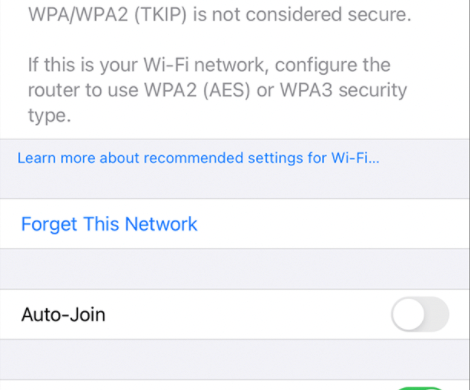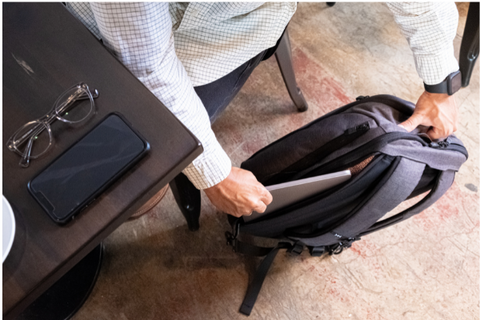With so many people telecommuting and traveling for business again, having healthy cybersecurity protocols is more important than ever. While cybercrime is a threat even at the office, travel can leave us more vulnerable to leaking and losing sensitive data – and worrying about protecting your personal and business information can add an edge of stress to your travels.
Luckily, there’s a lot that you can do to level up your digital security. According to a study by Tessian, 88% of data breaches are caused by human error, which means that 88% of data breaches are likely preventable. So this week, we’re sharing our top cybersecurity tips for remote workers and business travelers, so that you can protect yourself from data loss and theft – both malicious and accidental.

Summary of the cybersecurity tips for business travelers:
- Use strong passwords
- Use multifactor authentication
- Take extra precautions when using public WiFi
- Don’t open phishing emails, ever
- Install and update third-party antivirus software
- Protect your data from physical risks
Take a deep dive into the best digital security tips for business travelers:
Use strong passwords
Passwords are one of the weakest links when it comes to protecting our digital security, but it’s also all too easy to get lazy about them. Most of us like to use memorable passwords so that we don’t get locked out of our accounts, but the issue is that such passwords – like those that contain personal information and dictionary words – are incredibly easy for hackers to guess.
To have strong password practices before you travel:
- Make passwords 15 digits at a minimum, with a combination of letters, numbers, and special characters. Since it’s virtually impossible to remember such passwords, take advantage of a password manager. LastPass, Apple, and Google are all excellent free options and will sync across all of your devices.
- Clean up your digital footprint by never repeating the same password twice.
- Make sure that your passwords expire every six months, and then get them updated.
- Your password has likely been compromised if you’ve been using the same one for years and across many different accounts. Make sure your information is safe by plugging your stale password into Avast Password Checker (don’t worry, it’s fully encrypted), and find out if you need to take immediate action.
- Want more business travel advice? Check out this article.
Add an extra layer of security
Unfortunately, even strong passwords can get hacked. You can beef up the thin layer of security that passwords provide by enabling multifactor authentication. Multifactor authentication (MFA) can help protect your information – even if your password gets leaked – by requiring more information when signing in. MFA may send a one-time pin number to your phone, or a code to your email address.
It’s common that bank accounts automatically require two-factor authentication, usually done via the SMS method. However, an MFA smartphone app offers stronger protection because you can provide a wider range of secondary information – like unique tokens or biometrics. Google offers an awesome free MFA app for both Apple and Android.
The very best MFA, however, is a security key. A security key is a physical device that adds a higher level of authentication via a USB-C or Bluetooth connection to your personal device. Google hasn’t had a security breach ever since it required all company employees to use a security key. You can read about some of the best security keys here.
Take strong cybersecurity precautions in public WiFi
Resisting the temptation to use public wifi is particularly challenging when you’re traveling for work and desperately need to connect. But free airport, hotel, coffee shop, and city WiFi are all ideal places for bad guys to intercept your computer, steal information, and distribute malware.
So what’s a business traveler to do? You should always opt to use a private connection or your mobile hotspot to access the internet when traveling. But if public WiFi is your only option, get a private VPN. A private VPN encrypts your information so that even if a hacker gets onto your computer through a public wifi network, what they access is virtually useless. And cybercriminals are usually – though not always – after easy targets.
Whenever you travel, take these precautions around public WiFi:
- Never, ever login to financial accounts on public WiFi- and avoid logging into business accounts. If you do, make sure you’re using MFA.
- Never use public WiFi to log into company devices. If you’re traveling with a company device, ask to get a pre-installed private VPN.
- Don’t open popups or suspicious links.
- Only visit websites beginning with https (rather than http), as https adds some encryption to the server requests.
- Turn off your phone’s WiFi auto-connect and Bluetooth so that you don’t automatically connect to public WiFi.

Don’t open phishing emails, ever
In the chaos of business travel, it’s all too easy to let our guard down and mindlessly open a suspicious email that we usually wouldn’t have opened back at the office. But if we accidentally open a phishing email – which tricks the recipient into opening a dangerous link that can either leak information or distribute malware – we could face serious security breaches.
Remember the Colonial Pipeline hack in June 2021, which left so many East Coast cities with a serious gasoline shortage? The suspected cause was a phishing email. That said, don’t lose vigilance when you’re traveling. If you’re not totally sure if an email is safe, err on the side of caution and don’t open it. Over 3 billion phishing emails are sent every day and as cyber criminals learn how to bypass spam filters, they’re increasingly more difficult to recognize.
To help stop the spread of phishing emails, you can ask your company’s DNS (Domain Name Service) to set up a Sender Policy Framework (SPF). This framework is totally free and tells your DNS which servers are allowed to send an email from your company, making it much more difficult for a cybercriminal to impersonate an email from you or your company.
Install and update antivirus software before you travel
Lots of business travelers assume their operating system’s proprietary antivirus is good enough protection against viruses. But in reality, such antivirus protection mostly serves to make up for the OS’s vulnerabilities and doesn’t do enough to keep up with new and increasingly sophisticated viruses. Because a virus on your computer could potentially compromise all of the data from your company, the best defense is to install a third-party antivirus software.
Third-party antivirus software offers way more advanced protection against cyber threats. Antivirus software stops hidden malware in its tracks, but can also do a whole lot more – like help you manage junk files, protect your identity, and encrypt and store your data to protect you from data loss and theft.
While some antivirus software updates automatically, many users prefer to manually update the software because having the program run in the background can slow down the computer. So if you already have antivirus software, make sure it gets updated before traveling so you get the best protection from new viruses.
Don’t forget physical risks to your data

Cybercrime is only part of the equation when it comes to digital security. Here are some ways to protect your data and information from physical threats.
Protect it from damage
Always keep your electronics in safe, padded compartments. Ideally, your work bag or your travel bag will have dedicated pockets for your most important devices. For example, Knack Packs have a padded, sling-bottom laptop pocket and a microfleece-lined pocket for your tablet.
Learn more about protecting your tech when traveling here.
Protect it from loss
Always have backups of your files and work, both to cloud storage and to a physical device. For cloud storage, we highly recommend Google Docs or DropBox. Of course, keep those secure. Never let an external hard drive or USB memory stick fall into the wrong hands.
Protect it from theft
When you’re traveling for business, never leave your devices unattended (unless they’re locked safely away in a hotel room safe). All Knack Pack main compartments have locking zippers that are compatible with TSA-approved locks. And as electronic theft is also a threat, keep your important documents – like your passport and credit cards – in RFID-blocking pocket.
This pocket has RFID protection. Check it out.
Finally, stay mindful of the fact that criminals can steal the information the old-fashioned way – by spying over your shoulder. Stick a privacy screen on your laptop, and make sure that nobody’s watching you type your password onto your keyboard or phone.
Do you have any digital security tips that we missed? Please share them in the comments!
Ten articles before and after
How To Save Money On Holiday Travel
– JUNYUAN
How To Pack A Large Travel Backpack For Thanksgiving Weekend
– JUNYUAN
The BEST Gift to Give: Expandable Backpack
– JUNYUAN
The Best Carry-On Backpack Review & Roundup
– JUNYUAN
The Best Backpack For Your New MacBook (2021)
– JUNYUAN
The Best Size of Backpack For Travel
– JUNYUAN
How To Best Organize A Backpack For Travel
– JUNYUAN
Expert Insights On Working Remotely While Traveling
– JUNYUAN
4 Strategies To Fight Work From Home Burnout – JUNYUAN Bags




 Mobile/What's App/Wechat
Mobile/What's App/Wechat E-Mail
E-Mail ADD
ADD




